The Most Remarkable Benefits Of Using Natural Vinegar To Clean
Benefits Of Using Vinegar As A Household Cleaner
Is your home clean enough? Many of us ask this question about our homes. We wonder if our cleaning products are strong enough to keep out the strong viruses and bacteria that we experience today. But we also have another concern…and that is if these strong cleaning products are safe for our children. In this post I will hopefully persuade you that there are some very worthwhile benefits of cleaning with vinegar instead of harsh chemicals.
Here are 12 FREE motivation tips just for you…so you can start cleaning TODAY!
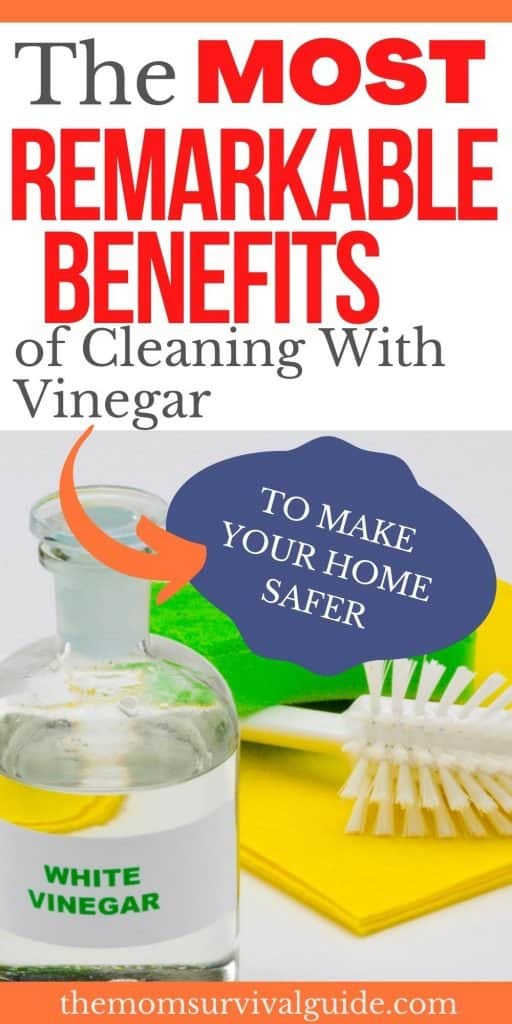
There are sponsored links on this page from which I may get a commission at no added cost to you. For more information, please read my Privacy Statement.
Scary Fact: According to a study done in Canada, using common household cleaners during infancy caused higher reports of asthma and wheezing in children. (https://www.cmaj.ca/content/192/7/E154).
The Benefits Of Using Vinegar To Clean
I have been cleaning my home with vinegar for the last 14 years…since my first child was born. Why? Because I am a scientist, and I knew there were chemicals in regular household cleaners that could affect the health of my family. So I made the switch, and to this day, I still believe in the benefits of using vinegar to clean my home.
If you are here to learn about an all natural cleaning product that can make your home healthier for your family, then you are definitely in the right place. Just check out all these benefits of using vinegar to clean:
- Non-toxic cleaner
- Mild disinfectant
- Absorbs odors
- Safe to use around pets and children
- Leaves no harmful residue
- Can be used as a multipurpose cleaner
- Cheaper than other household cleaners
Don’t want the headache of making your own family-safe, eco-friendly cleaner? I love MightyNest for all of my green cleaning needs.
How Vinegar Is Made
Believe it or not, vinegar really is a natural product. It is made by fermenting a product like wine, apple juice, grain, barley, or rice, and then allowing the natural bacteria in the solution “eat” the alcohol that was created in the fermenting process. And when the bacteria eat the alcohol, they produce something called acetic acid in it’s place.
If you don’t know, acetic acid is what makes vinegar…well, vinegar. Acetic acid gives vinegar it’s pH level, or acidity level. The acidity of something can make it taste sour. So there you have it. Vinegar tastes the way it does because of the acetic acid.
But what benefits does this acidity provide in an environment that you want clean? We’ll get to that, but first, here are a few types of vinegar you may be familiar with…
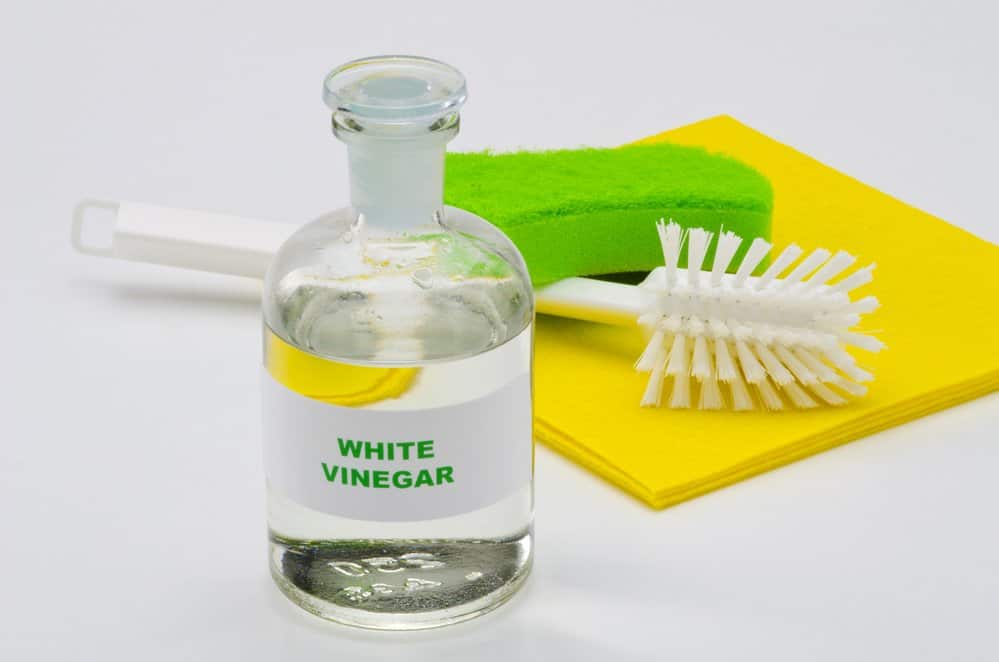
4 Common Types Of Vinegar:
There are loads of different types of vinegar. Although, the ones I have in my home most often are the ones you are going to find below. I think these vinegars are some of the most familiar, so here are some facts about them.
Apple Cider Vinegar
Apple cider vinegar is created from a natural source…apple juice. The apple juice is fermented which creates alcohol. Then the alcohol is turned into acetic acid by the bacteria present in the mixture…which makes apple cider vinegar.
Apple cider vinegar has about a 5%-6% acetic acid level, making it strong enough to clean with. Apple cider vinegar can have a less obtrusive smell than white vinegar due to the fact that it is made from apple juice.
Wine Vinegar
There are two kinds of wine vinegar. White wine vinegar and red wine vinegar. Both have an acidity level of around 4%-6%. Both can be used to clean, though keep in mind these two points:
- Both red and white wine vinegar contain color additives, so you would only want to use them in places where they will not stain what you are cleaning.
- Because they are considered “specialty” vinegar, they will be more expensive than a bottle of distilled white vinegar.
Distilled White Vinegar
Distilled white vinegar from a grain-based ethanol. White distilled vinegar acetic acid levels can range from 4%-5%, making it a good cleaning agent.
Distilled white vinegar is considered one of the best cleaning vinegars solely because it does not contain any coloring agent that could potentially leave stains.
Cleaning Vinegar
Cleaning Vinegar, like this one, is one other kind of vinegar you could use to clean your home. Cleaning vinegar is a little bit different than Distilled White Vinegar due to the fact that it’s acidity level is around 6%, making it stronger by about 20% according to sites like Fantastic Services Group and Family Handyman.
Industrial Vinegar (Not a common type of vinegar and you may not be familiar with it)
At 20% acidity, Industrial Vinegar, like this one, should not be used to clean things in your home or to cook with because it is too strong. Industrial Vinegar is often used as an herbicide in the garden.
Related Post You May Like: What To Stock In A Cleaning Caddy
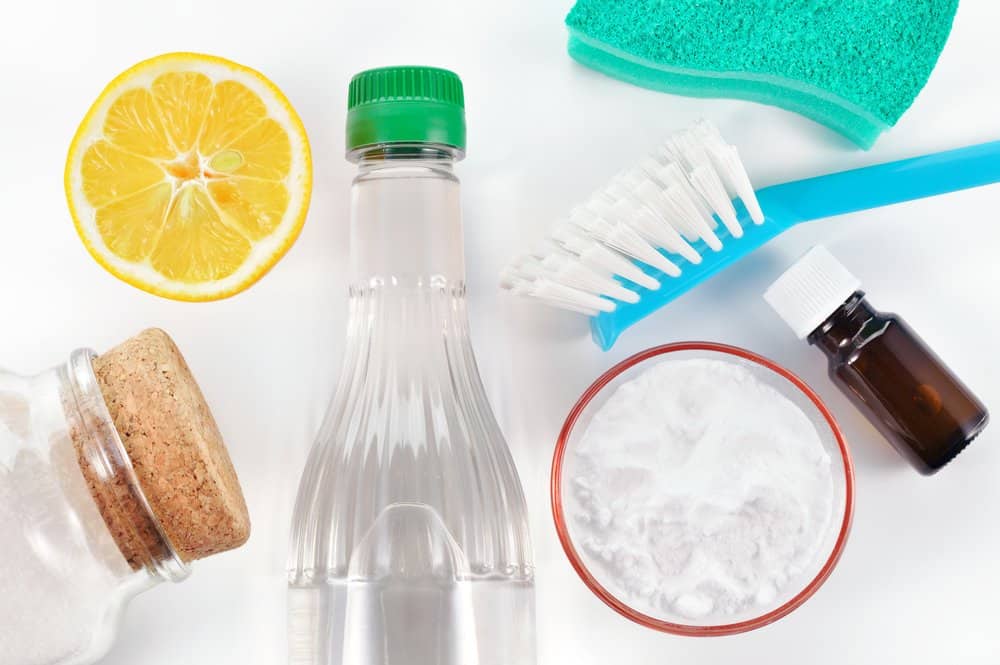
How The Properties Of Vinegar Help Clean Your Home
So here is a very quick and basic description of how vinegar works to clean your home
Benefits Of Using Vinegar To Clean As A Non-Toxic Cleaner
The acidity of vinegar help cut through things like soap scum and lime scale because they neutralize their properties. Soap has a basic pH and so does lime scale. So when you attack those messes with an acid, it cuts right through them.
So because vinegar is an acid, it can clean many areas of your home. And because it is a mild acid and natural, it is also safe around your kids and pets.
Also because of the mildness of this cleaner, one of the greatest benefits is that you can use it almost anywhere. Making it a great, inexpensive mulitpurpose cleaner for your home.
Benefits Of Using Vinegar To Clean As A Mild Disinfectant
Many…(not all)…common household viruses and bacteria cannot live in harsh conditions.
By harsh, I mean any condition that does not provide what it needs to survive or causes it harm. Many ways we create a harsh environment for these germs is through heat, salinity (saltiness), and pH (acidity).
That is where vinegar comes in. It is an acid…not a strong one, but enough of one that you can clean the majority of your home with it and it will get the job done.
Best Type Of Vinegar To Use For Cleaning
Distilled white vinegar or cleaning vinegar are the best two vinegar’s to choose from when you’re looking for a vinegar to clean your home. Unlike other types of vinegar like apple cider, balsamic, or wine vinegar’s, both distilled white and cleaning vinegar are clear so they will not stain anything in your home.
How To Get Over The Smell Of Vinegar
The smell of vinegar can be unappealing. But don’t let that stop you from using this wonderful cleaning agent!
Rest assured, that once you are finished using the vinegar to clean, it dries up. And after it dries up, the smell will completely go away.
As a matter of fact, vinegar is known to absorb smells. So if you have any other odors in your home, cleaning with vinegar can actually help get rid of those odors faster.

.
Areas Of The Home You Can Clean With Vinegar
Glass
Vinegar has been used for decades to clean glass. Using vinegar to clean windows can be an affordable, non-toxic, and affordable way to clean. All you need to do is clean the glass with a 1:1 mixture of vinegar and water. Then wipe the glass off with a clean and dry microfiber cloth (these are my favorite) to prevent streaking.
The same method of cleaning windows can also be used on other glass surfaces like glass cabinets, table tops, or end tables. The benefits of using vinegar to clean can be seen in so many different areas of the home.
Countertops
There are several benefits of using vinegar as a household cleaner in the kitchen. One place to start cleaning is on the countertops.
Because vinegar is a mild disinfectant, using it on the counter after food preparation can help keep germs and bacteria at bay.
Another benefit of using vinegar in the kitchen is that it is an odor absorber. So if you have just made something with a strong smell, like fish, then cleaning with vinegar can help get the smell out of the kitchen faster.
(Keep in mind that when you are working with raw meat that could leave behind Salmonella or E.coli, you will need to use a stronger cleaner. See the section for vinegar cleaning recipes at the end of this post to see how you can make a stronger vinegar solution.)
Faucets
Again, since vinegar is a mild disinfectant, it can help kill bacteria and viruses left behind on faucets and other bathroom and kitchen fixtures. And it is particularly useful on faucets that are stainless steel because cleaning with vinegar will not leave streaks.
he benefits of using vinegar to clean the faucets are that it leaves streak free shine, it is a mild disinfectant, and it is highly affordable.
Related Post: 19 Easy Daily Habits To Start: To Keep Your House Clean
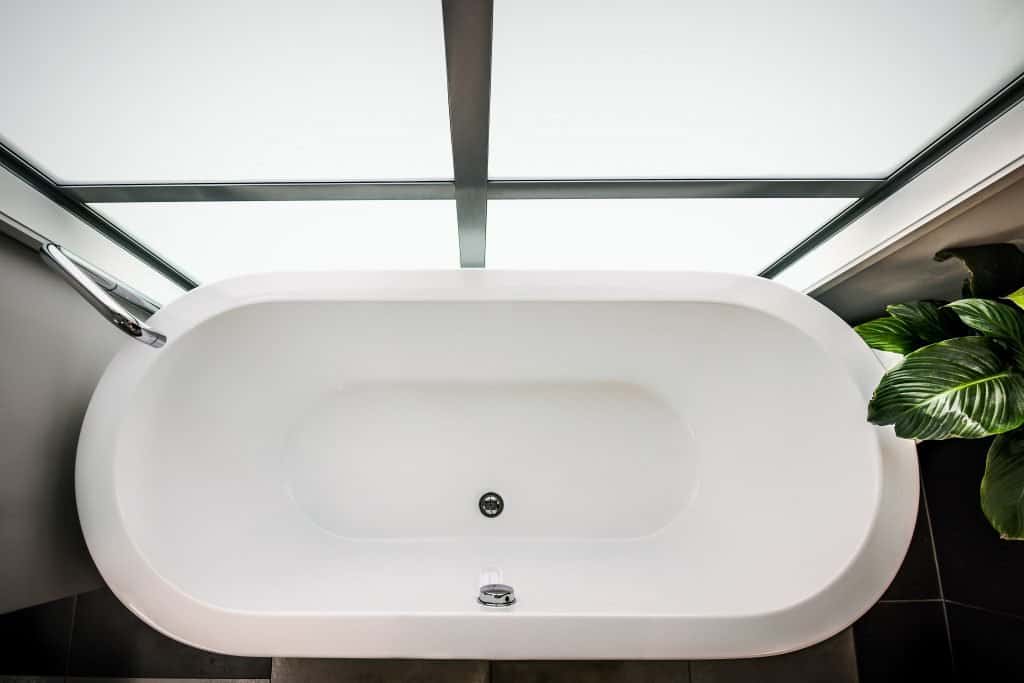
Showers and tubs
Showers and tubs are other places where it is beneficial to use vinegar as a household cleaner. Because vinegar is an acid, it can really help with limescale and soap build up in the shower and bath.
Another great place to use vinegar is of course, the glass shower doors. Since vinegar can both clean and leave glass streak free, it is an obvious choice for this area of your home.
You can soak the shower head in a plastic bag filled with vinegar to remove hard water deposits. Don’t forget to wipe down your faucets, counter tops, and mirrors while you are already in the bathroom
Toilets
The benefit of using vinegar to clean the toilet is that it can remove hard water stains and other stains that appear in the toilet.
It can also mildly disinfect the outside of the toilet and the flush handle.
To use on the inside of the toilet, pour about 2 cups of vinegar into the standing toilet water, let sit for 30 minutes, and then scrub with the scrub brush.
To use vinegar to clean the outside of the toilet, dilute 1:1 vinegar and water.
Floors
Vinegar is great for certain kinds of floors. Such as ceramic tile, linoleum, vinyl, or concrete. But do not use vinegar on wood floors or natural stone floors or it could ruin them.
The benefit of using vinegar to clean floors is that it is non toxic to pets and children, it is a mild disinfectant, and it is affordable.
Dilute vinegar 1:1 with water for the floor cleaning solution.
For a safe and eco-friendly solution you can use on hardwood or tile floors, try this one.
Dishwasher
Pour vinegar into the bottom of an empty dishwasher before running it. The vinegar will disinfect the dishwasher and also help remove hardwater buildup from the inside of the machine. The benefit of using vinegar to clean the dishwasher is that it is eco-friendly, and also affordable.
>>Find Other Eco-Friendly and Family-Safe home options at MightyNest.
Microwave
Did you know you can clean, disinfect, and deodorize the inside of your microwave by using a little vinegar and water?
Here is how it works. Grab a mug, fill it half way with vinegar and fill the other half with water. Set the mug in your microwave and turn it on for 2 minutes.
Let the mug of water and vinegar sit in the microwave for 5 minutes once the 2 minute cook timer goes off. This will loosen any food that has hardened on the inside of the microwave and make it super easy to wipe right off.
Related Post: How To Clean And Disinfect Microwave Fast With Apple Cider Vinegar
Coffee Maker
The coffee maker is a great place to use vinegar. The benefit of using vinegar to clean your coffee maker (this is my favorite coffee maker) is that it does not leave behind any chemical residue that may end up in your morning cup of joe.
Use a 1:1 solution of vinegar and water to remove limescale and clean the inside of your coffee machine.
Laundry
Vinegar can be used both in your laundry and on your laundry.
The best reasons to use vinegar in your laundry are, it can replace fabric softener as a less toxic and more affordable option.
…And it can also be used as a stain remover if you use undiluted vinegar on a stain. (Spot test the fabric first to make sure the vinegar will not cause damage.)
Related Post You May Like: The Best Reasons To Use Vinegar In Your Laundry
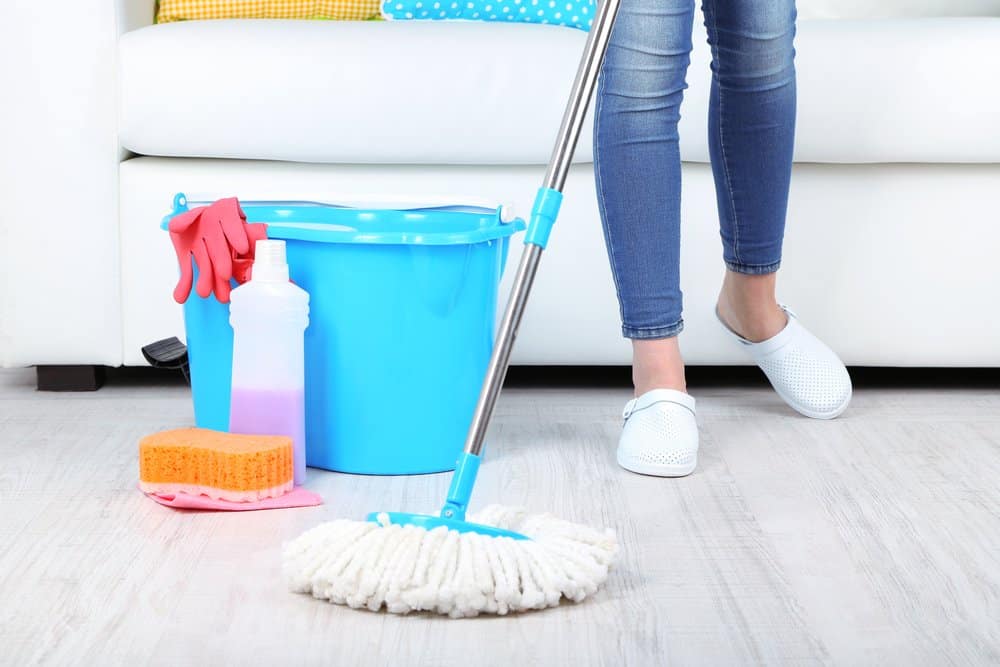
What NOT To Clean With Vinegar
- Natural stone
- Waxed wood
- Cast iron
- Aluminum
- Rubber
- Eggs
- Wood furniture
- Clothes iron
- Electronics
- Waxed flooring
- Wood floors
- Greasy messes
Do you have to rinse after cleaning with vinegar?
Yes. You need to rinse after washing with vinegar solely because it could leave behind a slightly sticky residue on surfaces if you use a vinegar other than distilled white vinegar or cleaning vinegar. Another reason to rinse is if you were to use it in your coffee maker. You do not want to risk your coffee tasting like vinegar.
Distilled White Vinegar vs. Cleaning Vinegar…What’s The Difference?
Distilled White Vinegar normally has an acidity level of 5% where Cleaning Vinegar has an acidity level of 6%. Therefore, cleaning vinegar is about 20% stronger than distilled white vinegar.

Can you mix baking soda and vinegar to clean?
Mixing baking soda and vinegar to clean is not a good idea unless what you are cleaning will benefit from a split second of oxidation. When you mix the two reagents, it immediately creates bubbles that create oxygen and can be beneficial for a few minutes of cleaning.
But, the long term effects of the mixing is pretty much worthless. Mixing baking soda and vinegar neutralizes the acidic benefits of the vinegar and the basic benefits of the baking soda since acids and bases neutralize one another. Instead, choose one or the other depending on what you are cleaning.
Another option is to use one, and then the other. Disinfect with vinegar, and then once finished, use the baking soda to scrub the area.
Is it safe to mix vinegar with dawn dish soap?
Mixing vinegar and dish soap is safe. However, mixing any soap (which is a base) with vinegar (which is an acid) will neutralize your solution. In short meaning your cleaning solution will no longer have that disinfecting or cleaning quality you are looking for.
Instead, I always like to clean the area with soap and water first to remove as many germs and oils as I can. Then I spray with full strength or 1:1 vinegar and water to disinfect the area.
Does vinegar kill food borne illnesses?
Vinegar alone will not kill major bacteria (such as Salmonella or E. Coli) that are associated with food borne illnesses. Regular vinegar is just not strong enough for that.
However… you can use the following “power” vinegar cleaners that I have outlined below to kill off the food borne illnesses according to NCBI (Article 1, article 2)
Don’t want to make your own stronger vinegar solution? Find eco-friendly and family-safe disinfectants ready-made on MightyNest.
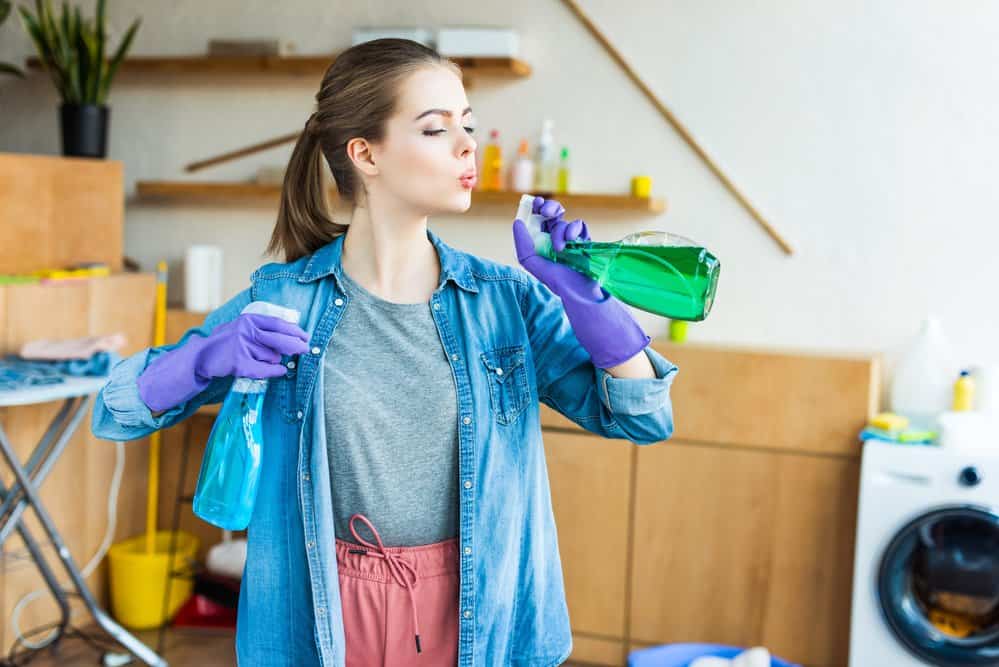
How To Make Vinegar Cleaning Solution Stronger, Naturally
If you need a stronger cleaning solution than diluted vinegar, there are ways of making vinegar stronger while still keeping all the other benefits of using vinegar to clean.
Stronger Vinegar Cleaning Solution To Kill E.Coli:
1 Cup of Vinegar
1 Tbsp of Salt (any kind)
Heat in a pan on the stove or in a mug in the microwave.
Carefully dip a rag into the hot solution and use to wipe down surfaces where E.Coli is suspected. Let the solution sit on the contaminated area for 30 minutes and then wipe the area down with soap and water.
Stronger Vinegar Solution To Kill Salmonella:
Use a 1:1 ratio of Vinegar and Lemon Juice. Do not dilute with water.
Let the solution sit for 30 minutes on the Salmonella contaminated area and then wipe the area down with soap and water.
Chemicals To NEVER Mix With Vinegar
Vinegar and Hydrogen Peroxide:
While these two products on their own can be powerhouse cleaners in your home, putting them together is not safe. Mixing these two products can create an acid that can burn skin and irritate eyes.
Granted the potency of the products you have in your home is low, and therefore the acid created would be weak. Still, it is safer to use these two products separately. Use two separate spray bottles.
Spray the area with one, wipe off with water, then spray the area with the other.
Bleach and Vinegar:
Separately, both bleach and vinegar have their uses for cleaning. Bleach is a powerful disinfectant that can be used to kill strong viruses like Coronavirus. And vinegar is a safe and non toxic way to clean mildly dirty areas of your home.
Related Post: No Sweat Practical Tips For Using Bleach In Your Home Safely
Overall Benefits Of Cleaning With White Vinegar
As stated in the beginning of this post, there are many benefits to cleaning with vinegar. Although, the biggest benefit is peace of mind.
When you chose to start cleaning with vinegar, know you are doing your absolute best to keep your family, environment, and budget safe.
So if you are not currently a person who uses vinegar to clean, I hope this article can assure you of all the benefits you can gain by making the switch.
Happy Cleaning!

Related Posts You May Like:
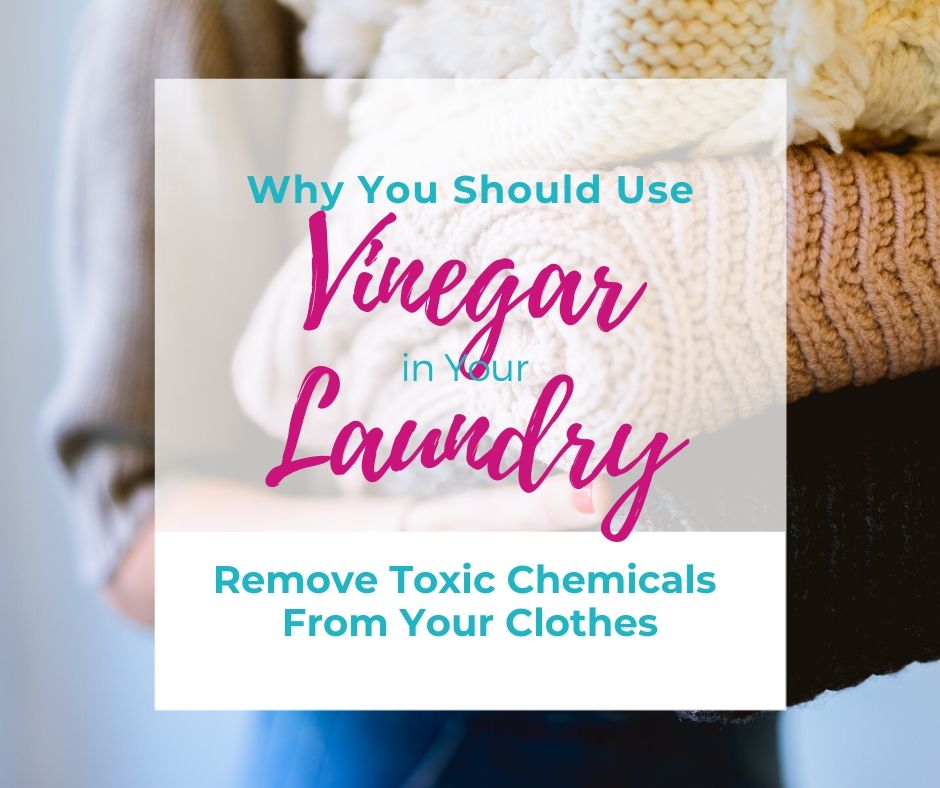
The Best Reasons Why You Should Use Vinegar In Your Laundry

As a stay at home mom myself, I have found ways to keep myself sane and organized while loving what I do …be home with my kids! After 14 years of being home, I realized other moms may benefit from some of the tips and tricks I have learned over the years. Join me to learn ways to manage your home and life as a stay at home mom so you can make time to enjoy the best part…family. Things I love…feeling motivated, Harry Potter, being outside, and digging deeper into my life and my family’s life in order to make it better. I have a Degree in Biology and am also a freelance writer.
